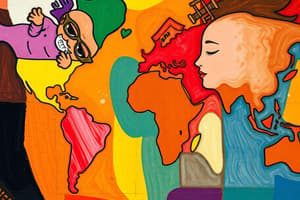Podcast
Questions and Answers
What was a major impact of World War II in terms of geopolitical changes?
What was a major impact of World War II in terms of geopolitical changes?
- The end of colonialism in Africa
- The expansion of the Ottoman Empire
- The rise of the United States and Soviet Union as superpowers (correct)
- The establishment of the League of Nations
Which factor is a significant contributor to global inflation rates?
Which factor is a significant contributor to global inflation rates?
- Higher levels of employment
- Increased wages in developing countries
- Reduced international trade agreements
- Supply chain disruptions (correct)
Which of the following mountains is part of the Himalayas?
Which of the following mountains is part of the Himalayas?
- Mount Fuji
- Mount Kilimanjaro
- K2 (correct)
- Mount McKinley
What principle is foundational to the scientific method?
What principle is foundational to the scientific method?
Which political geography organization focuses on collective defense among member countries?
Which political geography organization focuses on collective defense among member countries?
Which classic literary work was written by Herman Melville?
Which classic literary work was written by Herman Melville?
Which advancement in technology has raised significant concerns about user privacy?
Which advancement in technology has raised significant concerns about user privacy?
Who is recognized for their contributions to the theory of evolution?
Who is recognized for their contributions to the theory of evolution?
Which of the following is a key aspect of cultural movements during the Enlightenment?
Which of the following is a key aspect of cultural movements during the Enlightenment?
Which river is recognized as the longest river in the world?
Which river is recognized as the longest river in the world?
Flashcards are hidden until you start studying
Study Notes
Current Events
- Global Issues: Climate change, COVID-19 pandemic recovery, and geopolitical tensions (e.g., Ukraine conflict).
- Economics: Inflation rates rising worldwide, supply chain disruptions.
- Technology: Advancements in AI, cybersecurity threats, and digital privacy concerns.
- Politics: Key elections, significant policy changes, and social movements (e.g., climate activism).
History
- Ancient Civilizations: Contributions of Mesopotamia, Egypt, Greece, and Rome.
- Major Wars: World War I and II impacts, Cold War dynamics, and the rise of modern conflicts.
- Important Figures: Influential leaders like Mahatma Gandhi, Nelson Mandela, and Winston Churchill.
- Cultural Movements: The Renaissance, Enlightenment, and Civil Rights Movement.
Geography
- Continents and Oceans: Seven continents (Asia, Africa, North America, South America, Antarctica, Europe, Australia) and five oceans (Pacific, Atlantic, Indian, Southern, Arctic).
- Physical Features: Major mountain ranges (Himalayas, Rockies), rivers (Nile, Amazon), and deserts (Sahara, Gobi).
- Human Geography: Population distribution, urbanization, and migration patterns.
- Political Geography: Countries, capitals, and key international organizations (UN, NATO).
Science
- Key Disciplines: Biology, Chemistry, Physics, Earth Science, and Astronomy.
- Scientific Method: Steps include observation, hypothesis formulation, experimentation, and conclusion.
- Major Theories: Theory of Evolution, Laws of Thermodynamics, and Quantum Mechanics.
- Notable Scientists: Contributions of figures like Isaac Newton, Albert Einstein, Marie Curie, and Charles Darwin.
Literature
- Genres: Fiction, Non-Fiction, Poetry, Drama, and Literary Criticism.
- Classic Works: Influential texts such as "Pride and Prejudice," "1984," and "Moby Dick."
- Literary Movements: Romanticism, Realism, Modernism, and Postmodernism.
- Key Authors: Contributions of Shakespeare, Mark Twain, Virginia Woolf, and Gabriel García Márquez.
Current Events
- Climate change is a pressing global issue impacting ecosystems, economies, and public health.
- The COVID-19 pandemic recovery varies significantly between countries, affecting international relations and public policy.
- Geopolitical tensions are heightened due to conflicts such as the ongoing situation in Ukraine.
- Rising inflation rates are a concern worldwide, influencing consumer behavior and economic stability.
- Supply chain disruptions continue to affect global markets, leading to shortages and increased prices.
- Advancements in artificial intelligence have transformed industries, alongside rising concerns about cybersecurity and digital privacy.
- Significant political shifts occur with key elections and policy changes, reflecting social movements like climate activism.
History
- Ancient civilizations like Mesopotamia and Egypt laid the foundations for writing, governance, and architecture.
- Major wars, including World War I and II, reshaped national boundaries, economies, and global power structures.
- The Cold War introduced a period of tension between superpowers, influencing foreign policy and military strategies.
- Influential figures include Mahatma Gandhi, known for nonviolent resistance; Nelson Mandela, who fought against apartheid; and Winston Churchill, pivotal in World War II leadership.
- Cultural movements such as the Renaissance emphasized humanism and innovation, while the Enlightenment fostered ideas of reason and individual rights.
Geography
- The world comprises seven continents: Asia, Africa, North America, South America, Antarctica, Europe, and Australia, surrounded by five oceans: Pacific, Atlantic, Indian, Southern, and Arctic.
- Major physical features include the Himalayas and Rockies mountain ranges, along with significant rivers like the Nile and Amazon and large deserts such as the Sahara and Gobi.
- Population distribution shows varied urbanization rates, with significant migration patterns driven by economic opportunities and conflicts.
- Political geography encompasses countries, their capitals, and major international organizations like the United Nations and NATO, which play crucial roles in global governance.
Science
- Key scientific disciplines include Biology (study of living organisms), Chemistry (study of matter and its changes), Physics (study of matter and energy), Earth Science (study of Earth and its processes), and Astronomy (study of celestial bodies).
- The scientific method is a systematic approach encompassing observation, hypothesis formulation, experimentation, and drawing conclusions.
- Major theories include the Theory of Evolution, explaining the diversity of life; the Laws of Thermodynamics, governing energy transfer; and Quantum Mechanics, which describes behavior at atomic and subatomic levels.
- Notable scientists include Isaac Newton, known for laws of motion; Albert Einstein, famous for the theory of relativity; Marie Curie, a pioneer in radioactivity; and Charles Darwin, who formulated the theory of evolution by natural selection.
Literature
- Literature is categorized into genres such as Fiction, Non-Fiction, Poetry, Drama, and Literary Criticism, each with distinct characteristics.
- Classic works hold significant literary merit, including "Pride and Prejudice" (Jane Austen), "1984" (George Orwell), and "Moby Dick" (Herman Melville).
- Literary movements such as Romanticism focused on emotion and nature, Realism depicted everyday life, Modernism explored fragmented narratives, and Postmodernism challenged traditional forms.
- Key authors include William Shakespeare, renowned for his plays and sonnets; Mark Twain, known for his social commentary; Virginia Woolf, a modernist writer; and Gabriel García Márquez, famous for magical realism.
Studying That Suits You
Use AI to generate personalized quizzes and flashcards to suit your learning preferences.




